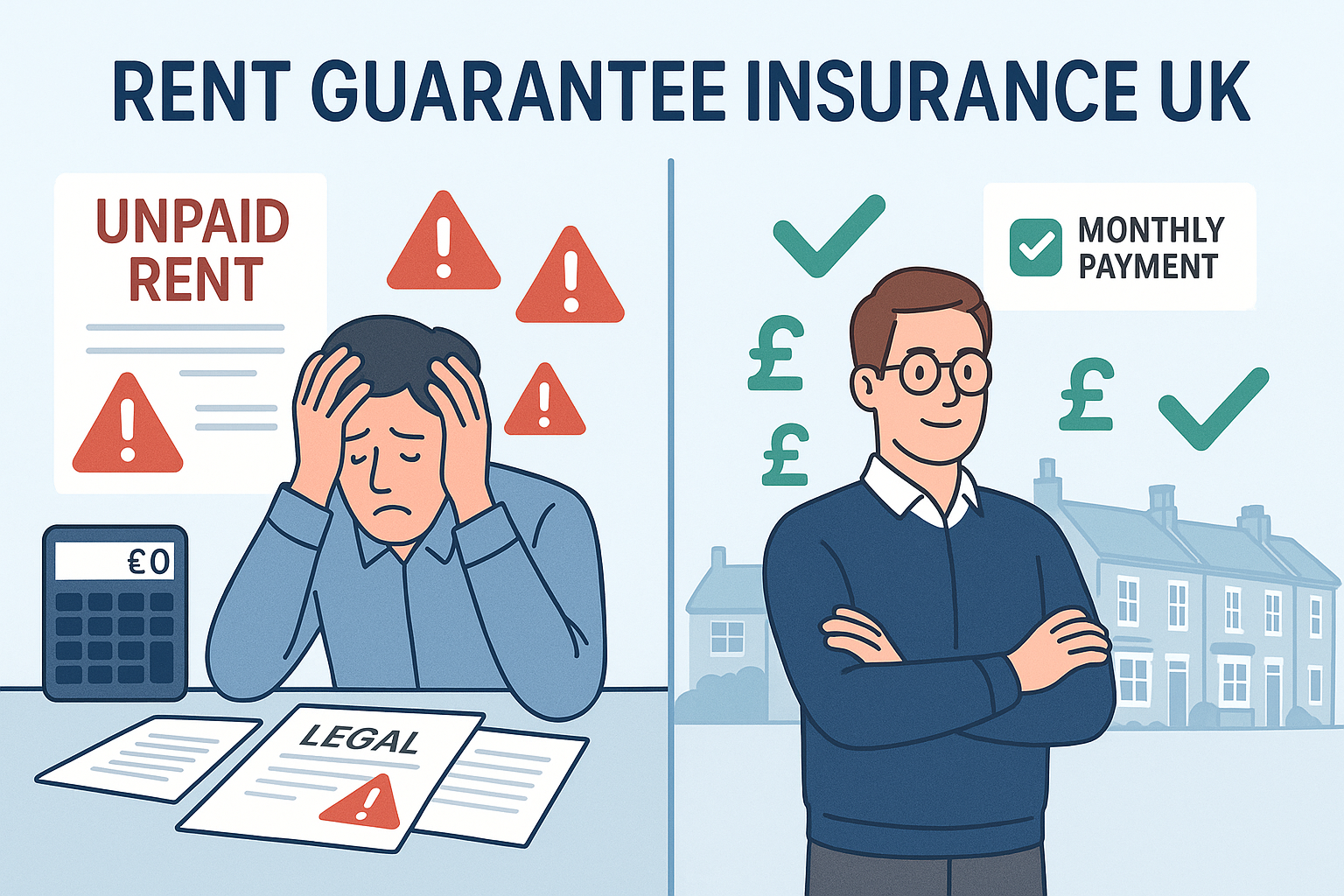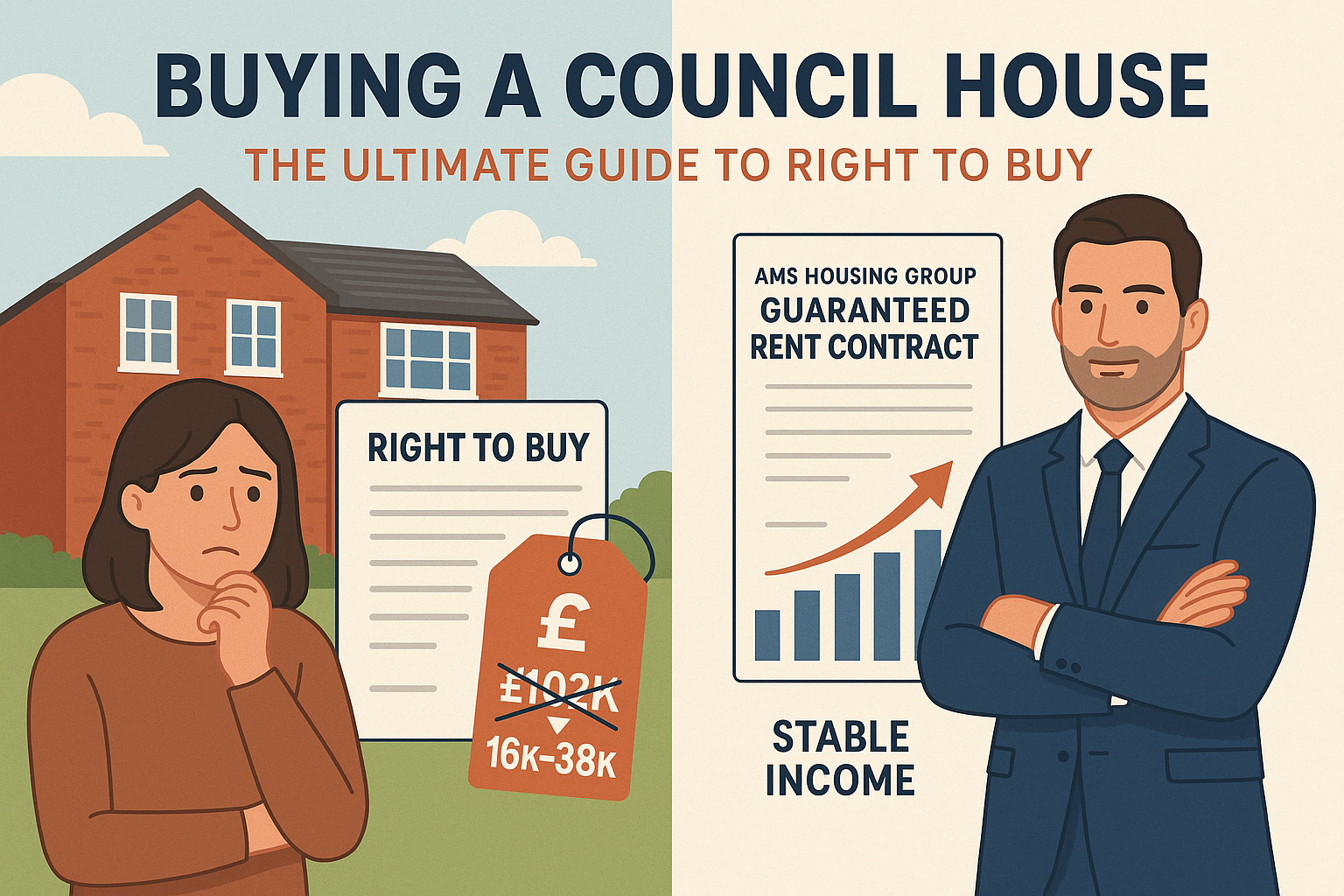Last Updated: September 2025 | Reading Time: 12 minutes
Table of Contents
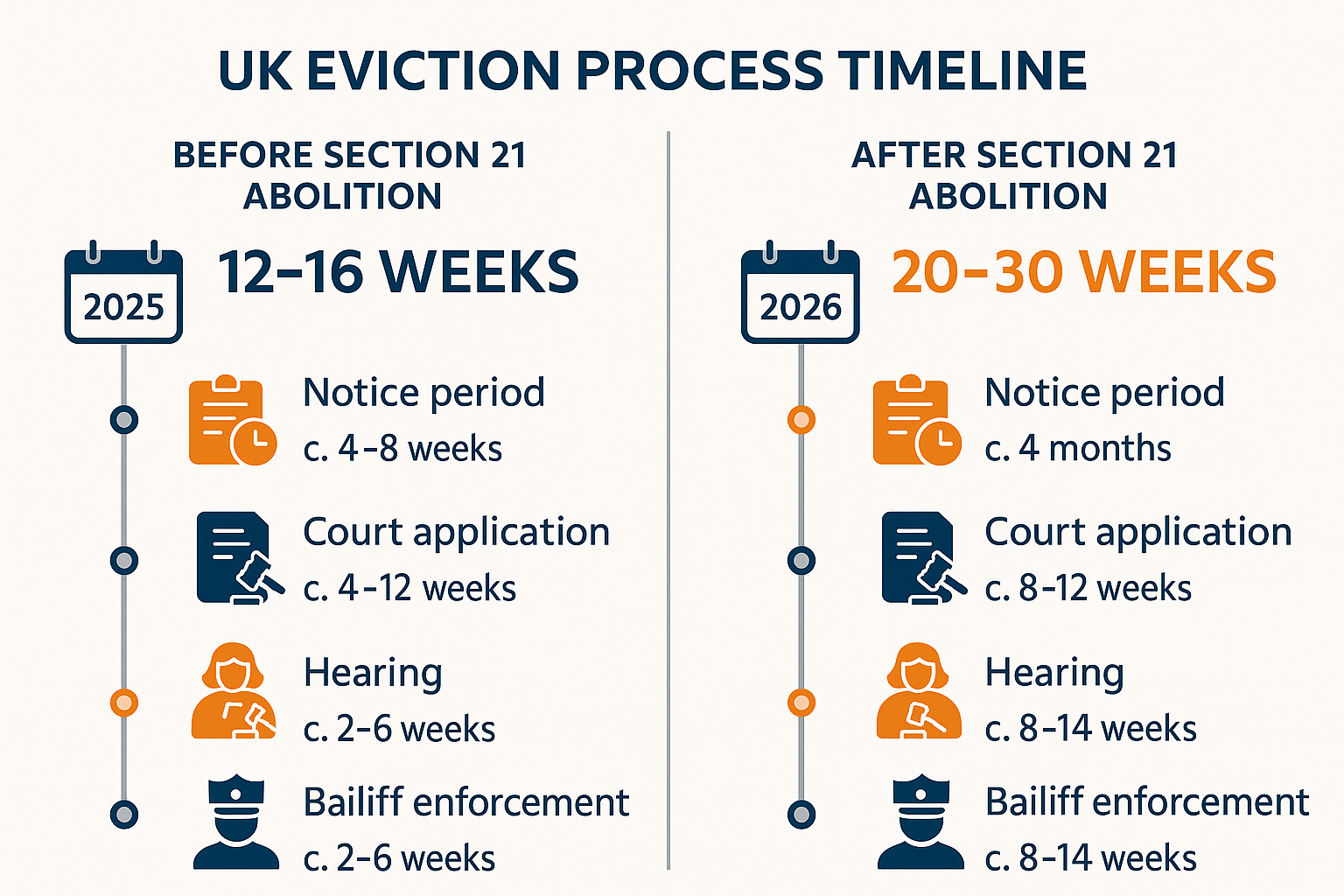
The landscape of UK tenant evictions is undergoing its most significant transformation in decades. With the Renters’ Rights Bill set to abolish Section 21 “no-fault” evictions in early 2026, landlords across England are facing a new reality where every eviction must be justified with valid legal grounds. This comprehensive guide will walk you through everything you need to know about the eviction process in 2025, the upcoming changes, and why many landlords are choosing guaranteed rent services as a stress-free alternative.
Key Takeaways
Critical Legislative Updates for 2025
The Renters’ Rights Bill represents the most significant shake-up of UK rental law in decades. Section 21 evictions will be completely abolished in early 2026, meaning all future evictions must be conducted under Section 8 with valid grounds. The mandatory rent arrears threshold is increasing from two to three months, and notice periods are being extended across most grounds. Perhaps most significantly, all possession cases will require mandatory court hearings, eliminating the current accelerated possession process.
Essential Process Overview
Successfully evicting a tenant in the UK requires following a strict three-step legal process. First, you must serve the correct notice with proper grounds and documentation. Second, if the tenant doesn’t leave voluntarily, you must apply to court for a possession order. Finally, if the court grants possession and the tenant still refuses to leave, you must use court-appointed bailiffs for enforcement. Self-eviction through changing locks or cutting utilities is illegal and can result in criminal charges.
Cost and Timeline Reality
The total cost of eviction ranges from £485 for a straightforward DIY case to over £3,000 when legal representation is required. The process typically takes 12-20 weeks under current law, but this is expected to extend to 20-30 weeks after Section 21 abolition. Success rates vary significantly, with Section 21 achieving 95%+ success compared to Section 8’s 85-90% rate.
Why AMS Housing Group’s Guaranteed Rent is the Smart Alternative
Rather than navigating the complex, expensive, and time-consuming eviction process, many landlords are choosing AMS Housing Group’s guaranteed rent service. For just 5-10% of your rental income, we guarantee monthly payments regardless of tenant issues, handle all property management responsibilities, and eliminate eviction stress entirely. Our service costs significantly less than a single eviction while providing ongoing peace of mind.
Understanding the Current Legal Framework
The UK’s eviction laws are currently in a state of transition, with significant changes coming into effect in early 2026. Understanding both the current system and upcoming changes is crucial for making informed decisions about your rental property strategy.
The Renters’ Rights Bill: A Game-Changer for Landlords
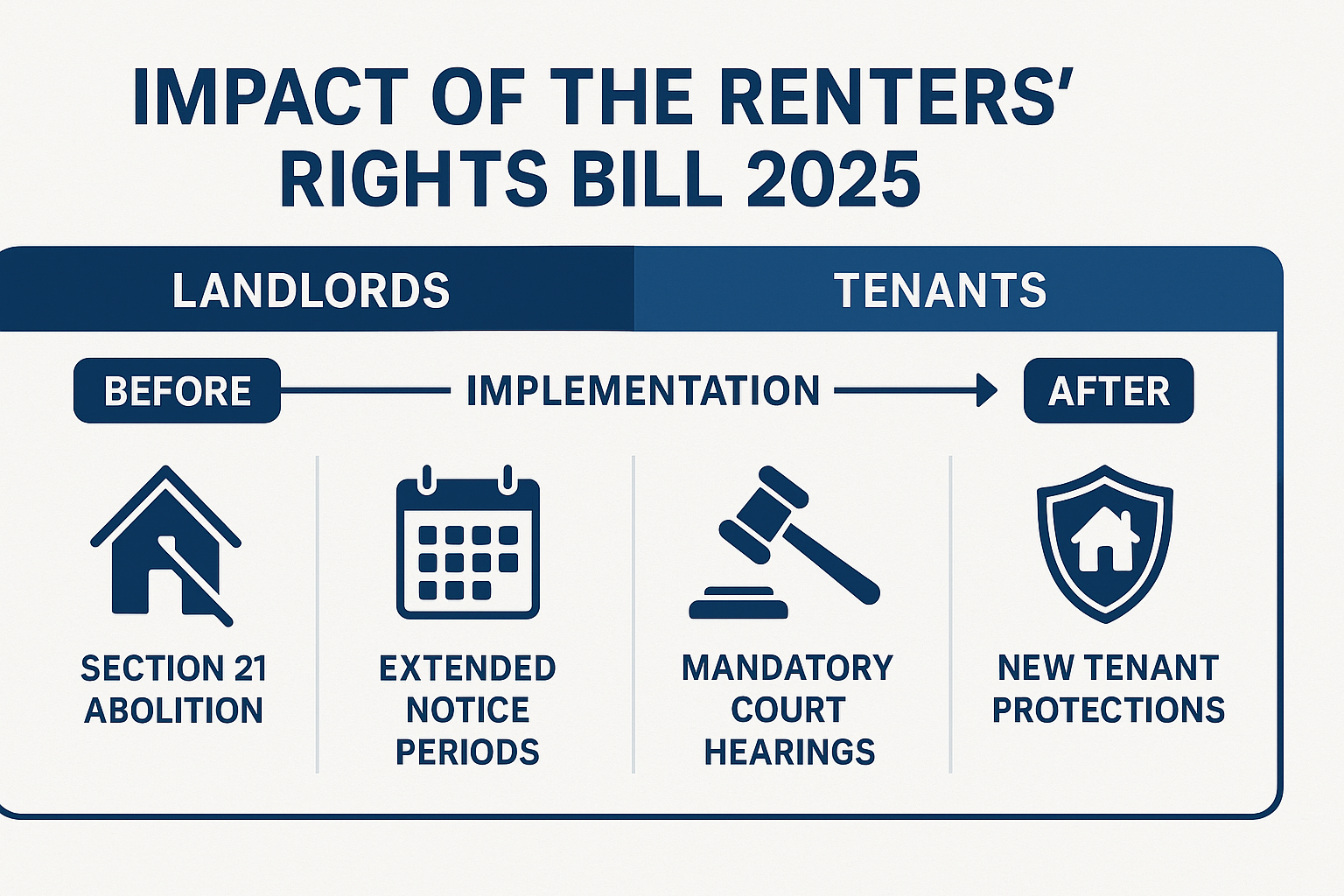
The Renters’ Rights Bill, which received Royal Assent in September 2025, will fundamentally alter how evictions work in England. The legislation aims to provide greater security for the 11 million private renters while ensuring landlords retain robust grounds for possession when justified.
The most significant change is the complete abolition of Section 21 “no-fault” evictions. Currently, landlords can serve a Section 21 notice requiring tenants to leave after two months without providing any reason. This will become impossible after the Bill’s implementation, expected in early 2026. Instead, all evictions will require valid grounds under Section 8, with landlords needing to prove their case in court.
The Bill also introduces a new tenancy structure where all assured tenancies become periodic, eliminating fixed-term agreements. This change aims to provide tenants with greater flexibility while preventing them from being trapped in substandard properties. For landlords, this means tenants can give two months’ notice to leave at any time, but it also means you cannot rely on fixed terms to guarantee rental income.
Current Eviction Routes: Section 21 vs Section 8
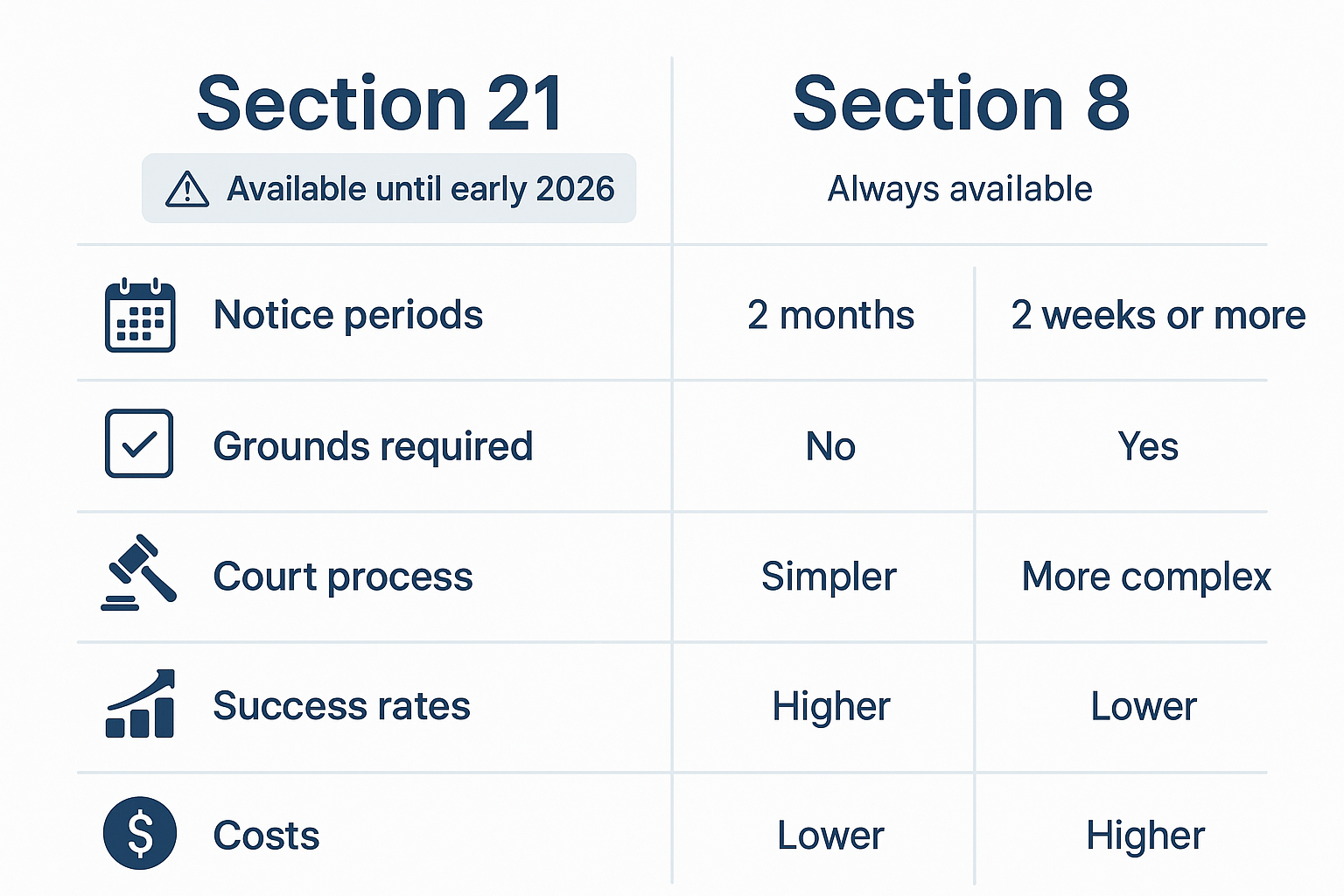
Understanding the differences between Section 21 and Section 8 evictions is crucial for choosing the right approach while both remain available. Section 21, often called “no-fault” eviction, allows landlords to regain possession without proving any wrongdoing by the tenant. The process is relatively straightforward: serve a Form 6A notice giving two months’ notice, wait for the notice period to expire, then apply for possession if the tenant hasn’t left.
Section 8 evictions, by contrast, require specific grounds for possession. These fall into two categories: mandatory grounds where the court must grant possession if proven, and discretionary grounds where the court has flexibility to consider whether eviction is reasonable. Common mandatory grounds include serious rent arrears (currently two months, increasing to three months in 2026) and situations where the landlord needs to move into the property.
The choice between Section 21 and Section 8 often depends on your specific circumstances and timeline. Section 21 is generally faster and more certain, making it preferable when you need possession quickly and don’t have specific grounds for Section 8. However, Section 8 can be faster in cases of serious tenant breach, particularly with mandatory grounds like significant rent arrears.
Step-by-Step Eviction Process
Successfully evicting a tenant requires meticulous attention to legal procedures and timing. Any mistakes in the process can result in delays, additional costs, or complete failure of your possession claim.
Step 1: Establishing Valid Grounds for Eviction
Before serving any notice, you must have a valid legal reason for seeking possession. This is particularly important as we transition toward a Section 8-only system. The most common grounds include rent arrears, breach of tenancy terms, anti-social behaviour, property damage, and landlord occupation needs.
For rent arrears, the current mandatory threshold is two months of unpaid rent, but this increases to three months under the new legislation. The arrears must be both at the time of serving notice and at the court hearing. For discretionary grounds like persistent late payment or minor breaches, you’ll need to demonstrate a pattern of behaviour and show that you’ve attempted to resolve the issues.
When planning to move into the property yourself or sell it, you must be able to prove genuine intent. The new legislation includes stronger penalties for landlords who misuse these grounds, so ensure your plans are legitimate and well-documented.
Step 2: Serving the Correct Notice
The notice you serve depends on your chosen grounds and must be completed with absolute accuracy. For Section 21 evictions, use Form 6A and ensure you’ve met all prerequisites, including providing the tenant with an Energy Performance Certificate, Gas Safety Certificate, and the government’s “How to Rent” guide. The notice period is two months minimum, and you cannot serve it within the first four months of the tenancy.
Section 8 notices use Form 3 and must specify the exact grounds you’re relying on. Notice periods vary significantly depending on the ground: serious rent arrears require only two weeks’ notice, while most other grounds require two months. Under the new legislation, many notice periods will be extended, so check the current requirements carefully.
Proper service of the notice is crucial. While you can serve notices by hand, recorded delivery, or email (if the tenancy agreement permits), ensure you can prove the tenant received it. Keep detailed records of when and how you served the notice, as you’ll need this evidence for court proceedings.
Step 3: Applying for Possession
If the tenant doesn’t leave after the notice period expires, you must apply to court for a possession order. Use Form N5 for standard possession claims or Form N5B for accelerated possession (Section 21 only). The court fee is currently £355, and you’ll need to provide evidence including the tenancy agreement, rent records, and proof of serving the notice.
For Section 21 claims, you may be eligible for accelerated possession, which is a paper-based process without a hearing. This is generally faster and cheaper, but it’s only available if you have no other claims (such as rent arrears) and have followed the procedure correctly. Remember that accelerated possession will not be available after Section 21 abolition.
Section 8 claims always require a court hearing where you’ll need to present your evidence and the tenant can defend the claim. Prepare thoroughly by organizing all relevant documents, photographs, and witness statements. The court will consider whether the ground is proven and, for discretionary grounds, whether it’s reasonable to grant possession.
Step 4: Enforcement Through Bailiffs
If the court grants a possession order and the tenant still refuses to leave, you must use court bailiffs for enforcement. Never attempt to evict tenants yourself, as this constitutes illegal eviction and can result in criminal charges and substantial fines.
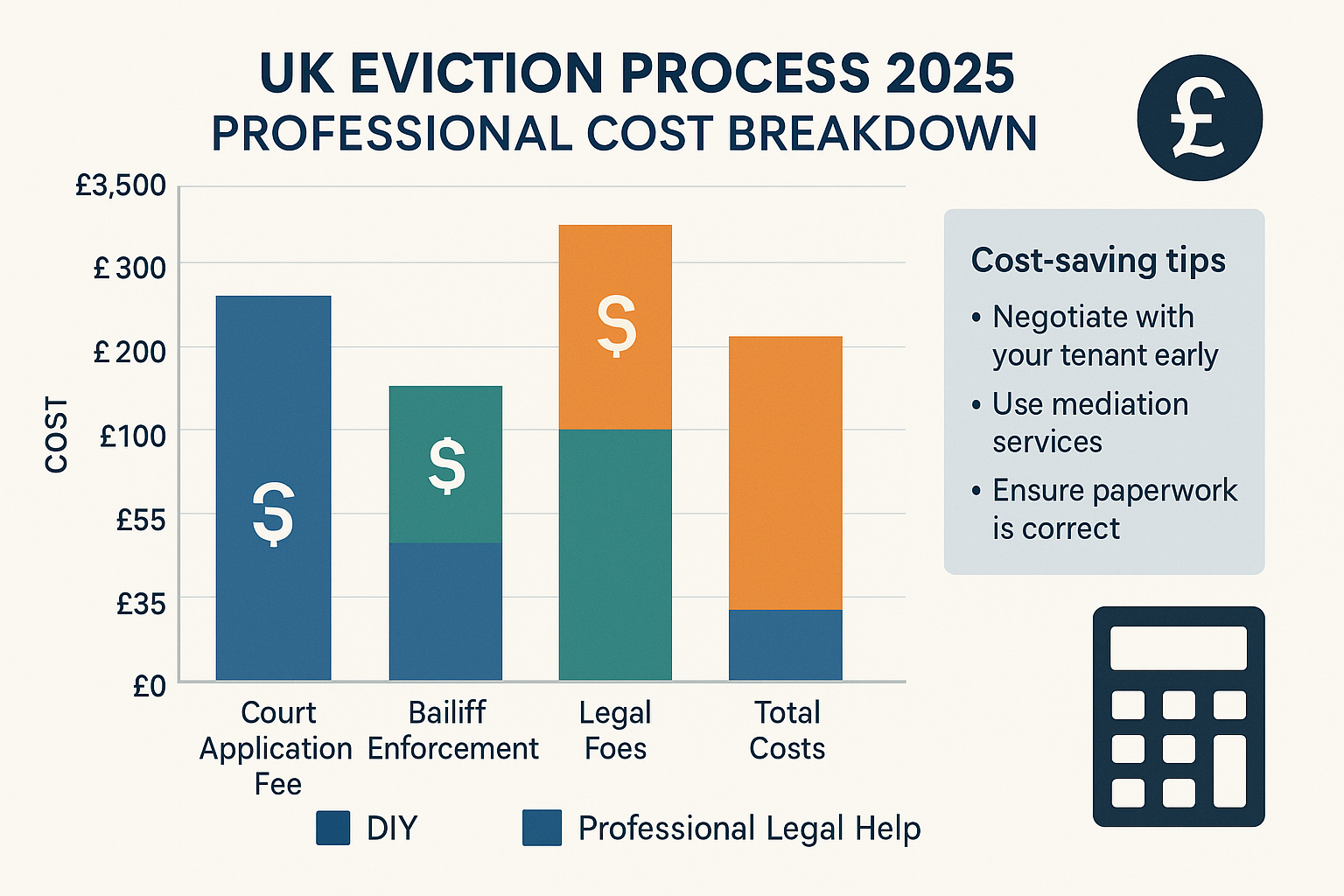
You have two main options for bailiff enforcement. County Court bailiffs cost £130 but typically take 4-10 weeks to execute the eviction. High Court enforcement officers cost £600-900 but usually act within 7-14 days. The choice often depends on your urgency and budget, though High Court enforcement is only available for possession orders over £600 or with the court’s permission.
Cost Analysis and Timeline Expectations
Understanding the true cost and time investment of eviction is crucial for making informed decisions about your property strategy. Many landlords underestimate both the financial and emotional toll of the eviction process.
The basic costs include the court application fee (£355), bailiff enforcement (£130-900), and potential legal fees (£500-2,000+). However, these figures don’t account for lost rental income during the process, which can easily add thousands to the total cost. A typical eviction takes 12-20 weeks under current law, meaning you could lose 3-5 months of rent even in a successful case.
Legal representation significantly increases costs but may be necessary for complex cases or when facing experienced tenant representatives. Many landlords attempt DIY evictions to save money, but mistakes can prove far more expensive than professional help. Consider the complexity of your case, your experience with legal procedures, and the potential consequences of errors when deciding whether to use a solicitor.
The upcoming changes will likely increase both costs and timelines. With all cases requiring court hearings and stronger tenant defences, legal representation may become essential rather than optional. Budget for 20-30 weeks and £1,500-4,000 for post-2026 evictions, though complex cases could cost significantly more.
Alternatives to Eviction
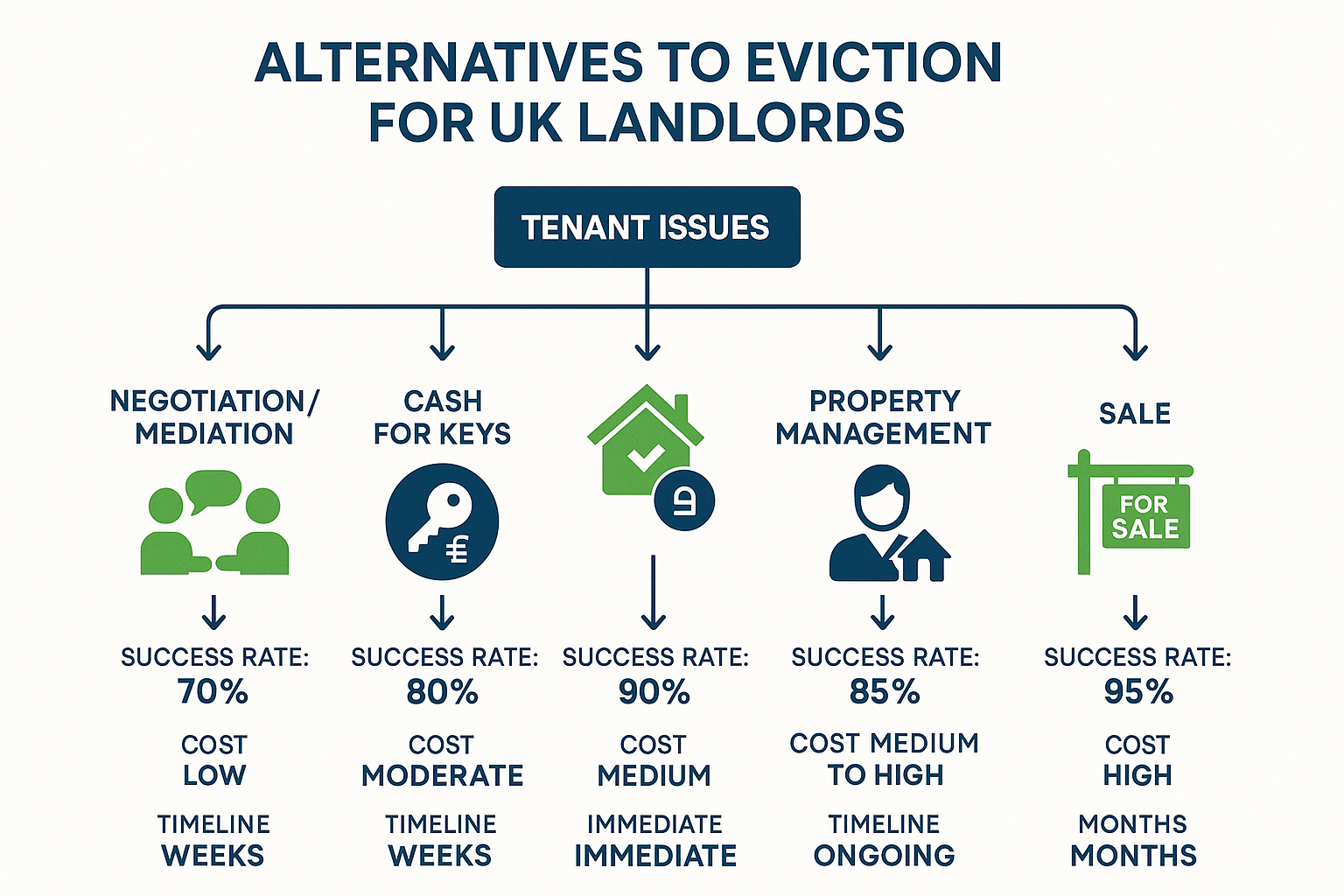
Before embarking on the eviction process, consider whether alternative solutions might achieve your objectives more efficiently and cost-effectively. Many tenant issues can be resolved through negotiation, mediation, or financial incentives without the stress and expense of court proceedings.
Negotiation and Cash for Keys
Direct negotiation with tenants often yields surprising results. Many tenants facing eviction are already looking for alternative accommodation and may welcome assistance with moving costs. “Cash for keys” arrangements, where you pay the tenant to leave voluntarily, typically cost 1-3 months’ rent but resolve the situation in 1-2 weeks with an 80-90% success rate.
When negotiating, approach the conversation professionally and focus on mutual benefits. Explain your situation honestly and offer practical assistance such as positive references, deposit return, or help with moving costs. Document any agreement in writing and ensure the tenant understands the timeline for vacating.
Professional Property Management
If tenant issues are part of a broader pattern of property management challenges, consider whether professional management might be more cost-effective than repeated evictions. Full management services typically cost 8-15% of rental income but include tenant screening, rent collection, maintenance coordination, and legal compliance.
Professional managers have experience dealing with difficult tenants and often resolve issues before they escalate to eviction. They also have established relationships with legal professionals and can handle eviction proceedings more efficiently when necessary.
AMS Housing Group’s Guaranteed Rent Solution
For landlords seeking complete peace of mind, AMS Housing Group’s guaranteed rent service eliminates eviction risk entirely. We guarantee your monthly rental income regardless of tenant behaviour, void periods, or property issues. Our service includes comprehensive property management, ensuring your property is maintained to high standards while you receive consistent income.
The cost of our guaranteed rent service (typically 5-10% of rental income) is significantly less than a single eviction, yet provides ongoing protection against all tenant-related risks. We handle tenant selection, rent collection, maintenance issues, and any necessary legal proceedings, allowing you to enjoy the benefits of property investment without the associated stress.
Common Mistakes That Cost Landlords Thousands
Learning from others’ mistakes can save you significant time, money, and stress. The most expensive errors typically involve procedural failures that invalidate your entire claim, forcing you to start the process again.
Procedural Errors
Invalid notices are the most common cause of failed eviction attempts. Using the wrong form, calculating notice periods incorrectly, or failing to include required information can render your notice worthless. Always double-check form requirements and consider having notices reviewed by a legal professional before serving them.
Timing mistakes are equally costly. Serving notices too early (such as Section 21 notices within the first four months), applying to court before the notice period expires, or missing court deadlines can delay your case by months. Create a detailed timeline and set reminders for critical dates.
Documentation Failures
Courts require comprehensive evidence to grant possession orders. Missing tenancy agreements, incomplete rent records, or inadequate proof of grounds can result in case dismissal. Start documenting issues from the beginning of any tenancy problems, including photographs, correspondence, and witness statements.
For rent arrears cases, maintain detailed payment records showing exactly when payments were due and received. For behaviour issues, document incidents with dates, times, and any police involvement. The more evidence you have, the stronger your case will be.
Illegal Eviction Attempts
Never attempt to evict tenants yourself by changing locks, cutting utilities, or harassing them to leave. These actions constitute illegal eviction and can result in criminal charges, fines up to £5,000, and civil claims for damages. Always use the legal process, regardless of how frustrating the situation becomes.
Preparing for the Post-2026 Landscape
The abolition of Section 21 will fundamentally change landlord-tenant relationships and property investment strategies. Successful landlords are already adapting their approaches to thrive in the new environment.
Building Stronger Tenancy Management
With evictions becoming more difficult and expensive, preventing problems becomes even more crucial. Invest in thorough tenant screening, including credit checks, employment verification, and previous landlord references. Consider requiring guarantors for higher-risk tenants and ensure your tenancy agreements are comprehensive and clearly written.
Maintain positive tenant relationships through responsive communication and prompt attention to maintenance issues. Happy tenants are less likely to cause problems and more likely to report issues early when they can be resolved easily. Regular property inspections help identify problems before they become serious.
Legal Compliance and Documentation
Ensure full compliance with all landlord obligations, including safety certificates, deposit protection, and property standards. Non-compliance can prevent you from using certain eviction grounds and may result in penalties. Keep detailed records of all compliance activities and maintain up-to-date documentation.
Consider investing in legal insurance or retaining a solicitor who specializes in landlord-tenant law. The increased complexity of post-2026 evictions means professional legal support may become essential rather than optional.
Portfolio Strategy Review
Some landlords may find the new landscape unsuitable for their investment strategy and choose to exit the rental market. Others may consolidate their portfolios, focusing on higher-quality properties in better locations with stronger rental demand. Consider whether your current portfolio aligns with the new regulatory environment and your risk tolerance.
For landlords choosing to continue, services like AMS Housing Group’s guaranteed rent become increasingly attractive. By transferring tenant risk to professionals, you can continue enjoying rental income without the increased complexity and cost of the new eviction procedures.
Why Choose AMS Housing Group’s Guaranteed Rent
As the eviction landscape becomes more complex and expensive, many landlords are discovering that guaranteed rent services offer superior returns with dramatically reduced stress and risk.
Complete Risk Transfer
Our guaranteed rent service eliminates all tenant-related risks from your investment. We guarantee monthly payments regardless of tenant behaviour, void periods, rent arrears, or property damage. You receive consistent income while we handle all tenant management responsibilities.
This risk transfer becomes particularly valuable in the post-2026 environment where evictions will be more difficult, expensive, and time-consuming. Rather than facing potential losses of £3,000+ and 6+ months for each problematic tenant, you enjoy guaranteed income and professional management.
Professional Property Management
Our service includes comprehensive property management ensuring your property is maintained to high standards. We handle tenant selection using rigorous screening processes, conduct regular inspections, coordinate maintenance and repairs, and ensure full compliance with all legal requirements including safety certificates.
Our team has extensive experience managing properties across London and Essex, with established relationships with reliable contractors and suppliers. This professional approach often results in better property condition and higher long-term values compared to DIY management.
Transparent Pricing and Service
Our guaranteed rent service typically costs 5-10% of your rental income, significantly less than the cost of a single eviction. This fee covers all management activities, tenant risk, and professional expertise. There are no hidden fees, surprise charges, or additional costs for dealing with problem tenants.
We provide regular property reports, transparent accounting, and responsive communication. You remain the property owner with full control over major decisions while we handle day-to-day management responsibilities.
Taking Action: Your Next Steps
Whether you’re currently facing tenant issues or planning for the future, taking proactive steps now can save you significant time, money, and stress.
Immediate Actions for Current Issues
If you’re currently experiencing tenant problems, assess whether eviction is truly necessary or if alternative solutions might be more effective. For serious issues like significant rent arrears or anti-social behaviour, consider using Section 21 while it remains available, as this may be faster and more certain than waiting for Section 8 proceedings.
Document all issues thoroughly and ensure you have valid grounds before serving any notices. If you’re unsure about the legal requirements or strength of your case, consult with a specialist solicitor before taking action.
Long-term Strategy Planning
Review your property portfolio and investment strategy in light of the upcoming changes. Consider whether you have the time, expertise, and risk tolerance to manage properties under the new regulatory environment. Many successful landlords are choosing to partner with professional management companies or guaranteed rent providers to maintain their investments while reducing personal involvement.
Evaluate the costs and benefits of different approaches, including DIY management, traditional letting agents, full management services, and guaranteed rent providers. Consider not just the immediate costs but also the time investment, stress levels, and potential risks of each option.
Contact AMS Housing Group
If you’re interested in learning more about our guaranteed rent service or need assistance with current tenant issues, our experienced team is here to help. We provide free consultations to assess your situation and explain how our services can benefit your specific circumstances.
Contact us today at 020 3488 4000 or visit our contact page to schedule a consultation. Our team covers properties throughout London and Essex, and we’re committed to providing professional, reliable service that protects your investment while maximizing your returns.
You can also explore our other services including property management, HMO licensing, and landlord certificates to ensure your property portfolio is fully compliant and professionally managed.
Conclusion
The UK’s eviction landscape is undergoing unprecedented change, with the abolition of Section 21 marking the end of an era for landlord-tenant relationships. While these changes aim to provide greater security for tenants, they also create new challenges and costs for landlords who must navigate an increasingly complex legal framework.
Understanding the current eviction process, preparing for upcoming changes, and considering alternatives like guaranteed rent services are essential for maintaining successful property investments. The choice between managing these challenges yourself or partnering with professionals like AMS Housing Group will significantly impact your experience as a landlord in the years ahead.
As the rental market evolves, those who adapt their strategies and embrace professional solutions will continue to thrive, while those who resist change may find property investment increasingly stressful and unprofitable. The key is making informed decisions based on accurate information, realistic cost assessments, and honest evaluation of your own capabilities and preferences.
This guide provides general information about UK eviction law as of September 2025. Laws and procedures can change, and individual circumstances vary. Always consult with qualified legal professionals for advice specific to your situation. AMS Housing Group is not a law firm and does not provide legal advice.



